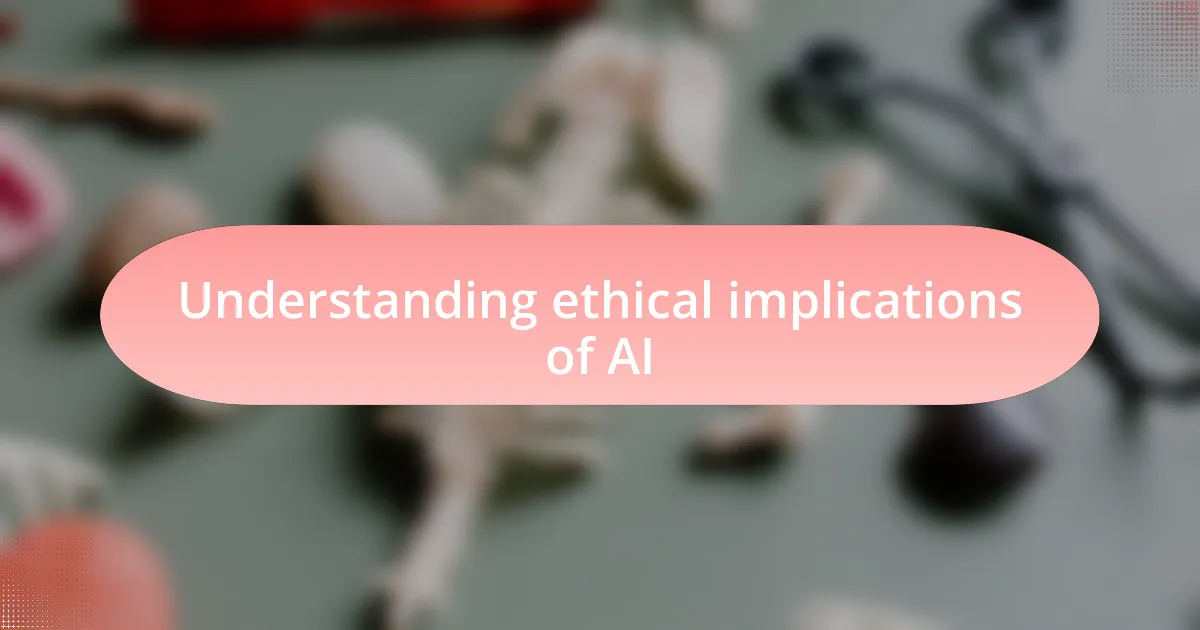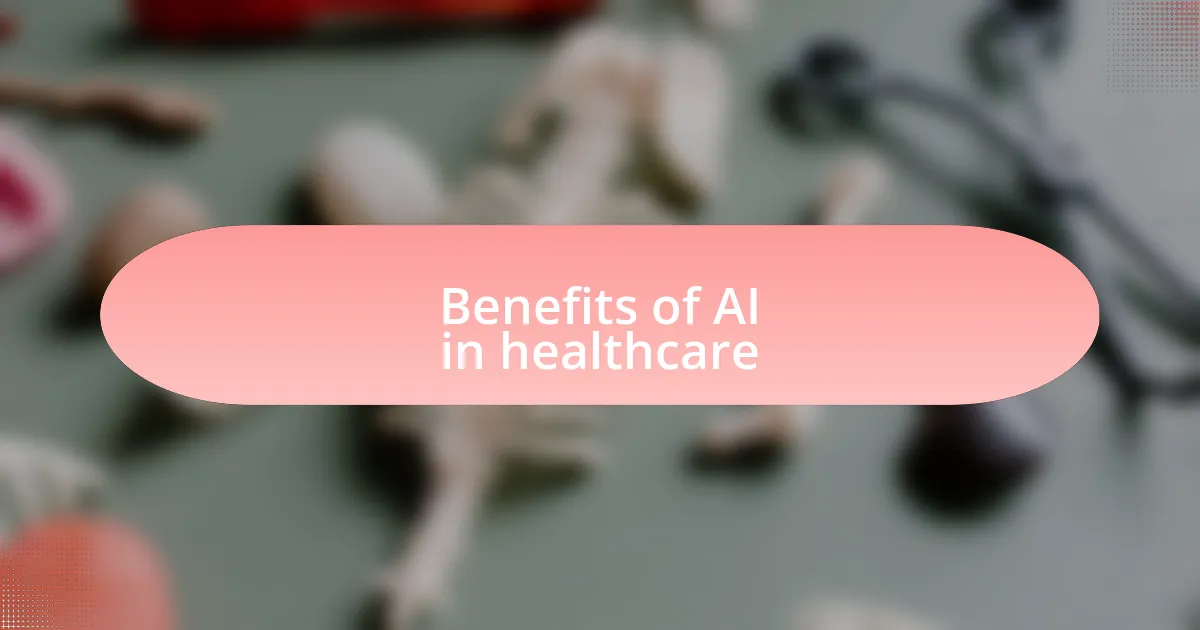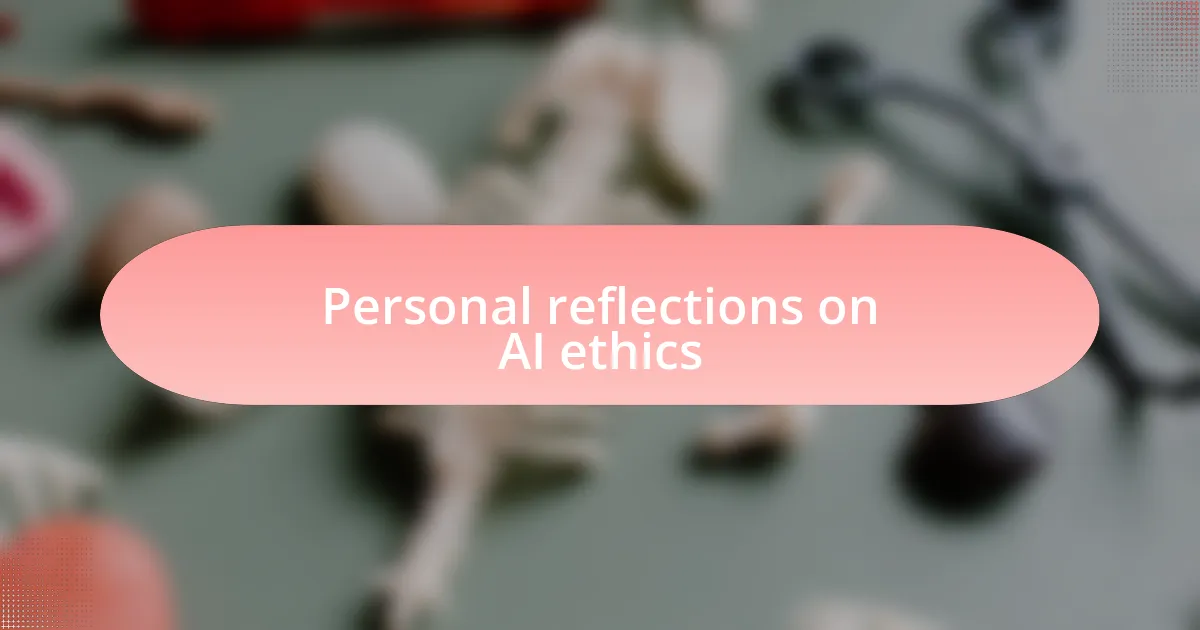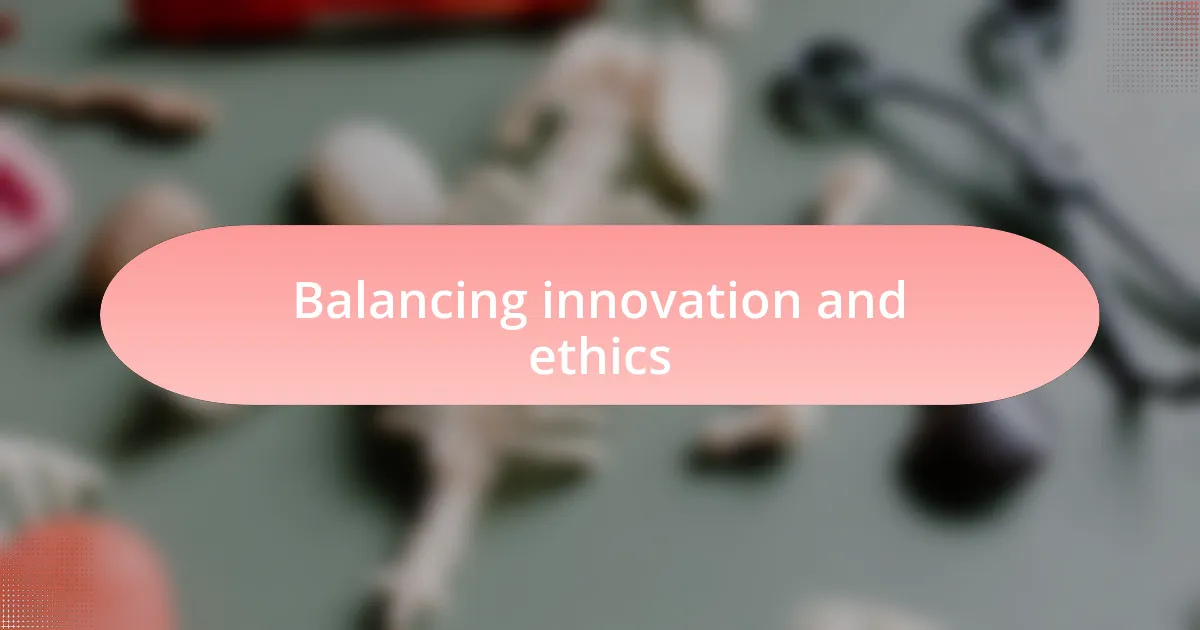Key takeaways:
- The ethical implications of AI in healthcare include accountability for errors and bias in algorithms affecting marginalized populations.
- AI enhances healthcare through rapid data analysis, improved drug discovery, and robotic assistance in surgeries, which can significantly benefit patient outcomes.
- Challenges such as data privacy, trust in AI decision-making, and equitable access to technology highlight the need for a balance between innovation and ethical standards in AI integration.
- Engaging diverse voices in discussions about AI development is crucial to prevent exacerbating health disparities and ensuring responsible usage of technology.

Understanding ethical implications of AI
When I first started delving into the field of AI in medical research, I was struck by the ethical dilemmas that emerged alongside the technological advancements. The ability of AI to forecast patient outcomes is a double-edged sword; while it can significantly enhance treatment protocols, we must ask ourselves—who is truly responsible when an AI system makes a mistake? This kind of responsibility is not just a legal matter; it touches on our core ethical principles.
Reflecting on my experiences, I recall a discussion with a colleague who passionately advocated for AI in diagnostics, yet expressed concern about bias in algorithms. This resonated with me because it highlighted a crucial point: if the data fed into these systems is flawed, can we ever trust the outcomes they provide? The implications of AI’s decisions can disproportionately affect certain populations, making it essential for us to continuously evaluate the fairness of these technologies.
Moreover, I’ve found myself pondering the interplay between technological progress and human empathy. Can an AI, regardless of its capabilities, ever fully replicate our intuition and compassion in patient care? This question weighs heavily on me, as it underscores a fundamental aspect of medicine—the human connection that is irreplaceable, no matter how sophisticated our tools become.

Benefits of AI in healthcare
The integration of AI in healthcare brings exciting advancements that I have witnessed firsthand. For instance, AI algorithms can analyze vast amounts of patient data almost instantaneously, leading to quicker diagnosis and personalized treatment plans. Imagine a scenario where a patient with rare symptoms receives a timely diagnosis that may have taken weeks or even months to reach using traditional methods. Those moments highlight how AI can truly save lives.
Additionally, I’ve been amazed by the role of AI in drug discovery. In my experience, researchers have leveraged machine learning to identify potential drug candidates faster than ever before. This not only reduces costs but also accelerates the time it takes to bring vital medications to market. Reflecting on the countless lives that could benefit from earlier access to effective treatments, it’s clear that AI’s potential in this area is monumental.
Furthermore, consider the way AI-enhanced robotics are transforming procedures in the operating room. Skilled surgeons can now utilize robotic systems that enhance precision and control. I remember a case where a colleague shared how a robotic-assisted surgery significantly reduced recovery time for patients, allowing them to return to their lives sooner. Such advancements demonstrate how AI is not just revolutionizing healthcare; it’s improving the overall quality of life for patients and caregivers alike.

Personal reflections on AI ethics
Reflecting on the ethical implications of AI in healthcare, I’ve often found myself grappling with the balance between innovation and responsibility. For instance, when I attended a conference on AI in medicine, a discussion on data privacy struck a chord with me. How can we ensure that patient data, which is crucial for AI development, is kept safe while still harnessing its potential? This tension leaves me pondering the moral responsibilities we have toward patients and their information.
In my experience, I’ve observed a growing unease about decision-making processes in AI systems. I remember a case where an AI tool made a recommendation for treatment that was later questioned by a medical team. It made me realize: who is truly accountable when an AI system errs? This scenario isn’t just a technical concern; it’s about trust in the medical system and the importance of human oversight in AI-driven decisions.
Moreover, the rapid advancement of AI raises questions about equity in healthcare access. I recall a project I participated in, which aimed to deploy AI solutions in underserved communities. I’ve seen firsthand the disparity in technology access; it often mirrors the broader inequalities in healthcare. How do we ensure that all patients benefit from AI advancements instead of just a privileged few? These reflections are vital as we navigate the future of AI in medical research.

Balancing innovation and ethics
Balancing innovation and ethics in AI within healthcare demands a nuanced approach. I once encountered a scenario where an innovative AI algorithm promised to revolutionize early cancer detection. Yet, there were serious concerns about its accuracy across different demographics. This made me reflect: how can we advocate for groundbreaking technology while ensuring it does not exacerbate existing health disparities?
In my view, fostering an environment where innovation thrives alongside ethical standards is not just ideal; it’s essential. For instance, I participated in a brainstorming session with developers and healthcare professionals where we debated the potential biases in AI training data. I felt a sense of urgency in that room; if we didn’t address these biases early on, we risked creating tools that could misdiagnose or overlook critical conditions. I wondered, are we doing enough to actively include diverse voices in these conversations?
Ultimately, the journey of integrating AI into healthcare is fraught with decisions that test our core values. I often reflect on how my colleagues and I shared stories from the frontlines, emphasizing patient-centered care. It struck me deeply: the heart of medical innovation lies not solely in technology itself, but in how we choose to wield it, ensuring that ethical considerations are never an afterthought.